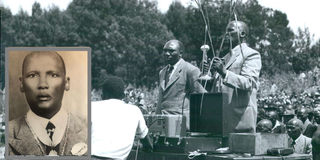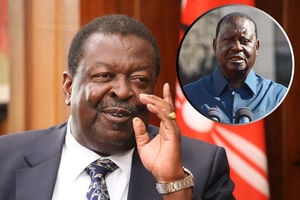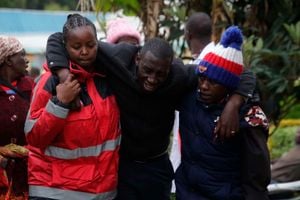A call for courts to revise judicial Injustices from the colonial era

Colonial era Senior Chief Waruhiu (also inset).
The audacious assassination of loyalist Chief Waruhiu in October 1952 was among a series of events that led to the declaration of the brutal State of Emergency by the British colonial government.
Seventy years later, his granddaughter revisits the high-profile killing, including questioning if it was the Mau Mau that did it as has been widely documented, and proposes a fresh look into this and other significant cases
African Socialism as envisioned in Sessional Paper No. 10 by our great leaders remains our true north. With calls for justice coming from different factions in the country, as a family, we would like to challenge the narrative surrounding our grandfather’s death and highlight numerous illegalities that led to what we consider a great miscarriage of justice.
For a detailed analysis of Senior Chief Waruhiu’s murder trial, you would need to read my late uncle Samuel N. Waruhiu’s book, Corridors of British Colonial Injustice. My uncle delved deeply into the facts and spelt out glaring errors in the collection of evidence and conduct of the trial within a trial. We are now duty-bound to carry on from where he left off.
East African Court of Appeal
The investigations following my grandfather’s death on October 7, 1952, and the subsequent trial within a trial that went all the way to the East African Court of Appeal were marred with illegalities. But first, let me introduce you to the man. Senior Chief Waruhiu grew up in an American-led mission station (GMS) that saw him become an early convert and evangelist of the faith.
He preached the word of God, formed part of the first native choir in Kambui and won souls for Christ. He was a family man who protected and provided for his family well. His life in public service spanned 30 years and began with the advocacy for the rights of Kikuyus who were being forcefully evicted from their land.
He worked hard and always produced results in the advancement of his district of Kiambu earning him numerous rewards and honours.
First was the Certificate of Honour in 1930 approved by the King of England for his outstanding abilities. Second, in 1935 the Jubilee Medal, third, in 1936 the King’s medal for African Chiefs in recognition of his commitment to acts of service for his community. Fourth, in 1937 the Coronation medal and lastly in 1951, the (MBE) member of the British Empire medal for his exceptional merit and efficiency in administration.
Residents of Kiambu are beneficiaries of his efforts in securing funding for dispensaries in his localities such as in Githunguri, Wangige, Kirenga to mention a few, and most prominently what stands today as the Kiambu Level V hospital after much expansion over the years.
In education under Waruhiu’s leadership, the Kiambu council made a financial contribution to the construction of Kagumo Primary School in Nyeri and the Githunguri Teachers College for which they raised funds by harambee. He also supported the Kiambu Local Boys Scouts with various donations. Waruhiu Farm was set up because of his passion for agriculture and advanced farming methods, now Waruhiu Agricultural Training Centre was his vision that his children and friends brought to fruition.
Waruhiu’s death was not as black and white as most would think. There is a lot of mystery surrounding the last two years of his life and more specifically the last 10 months. The European white settler farmers were the only group of people who had a very specific and constant demand for the colonial administration to declare a state of emergency.
This was the only assurance they would have of retaining their 999-year leases on land where they were growing their cash crops with cheap labour and a ready market in Britain and parts of Europe. How far were they willing to go?
Why was the plot of my grandfather’s death scripted like a scene in a James Bond movie? From a high-speed car chase to a gun-wielding assassin casually slipping his hand in his jacket, calling my grandfather’s name, shooting him, ducking into his waiting car and speeding off. This was the only murder of its kind in that entire colonial era.
Down memory lane
Why am I taking you on this trip down memory lane? Well, because we were never taught most of the actual history of Kenya. The history of the people. What they accomplished in their lives, and what they believed in. Instead, the lives of our great legends were summarised in no more than a paragraph from the lens of non-Kenyans. Our history must be personalised and meaningful with Kenyans as our primary source.
Now, with that prelude, I dive right into an issue that is of great concern to many Kenyans as we continue to reflect and learn more about that era.
The atrocities that were carried out are no secret, but as this nation heals, access to the documentation of those colonial years is crucial. There is a need to have a structure where families affected by colonial injustices can appear before a special tribunal or court and speak about these injustices. Our Constitution provides at Article 169 (1)(d) that a sub-ordinate court or local tribunal may be established by an Act of Parliament and 169 (2) that ‘Parliament shall enact legislation conferring jurisdiction, functions and powers on the courts established’.
Revision of a criminal case is a provision in our laws which means the assessment of the conduct of the judicial court with regard to process and order in arriving at its decision. Our Criminal Procedure Code section 362 stipulates that ‘The High Court may call for and examine the record of any criminal proceedings before any subordinate court to satisfy itself as to the correctness, legality or propriety of any finding...’
Create a tribunal
Can we create a structure that can encompass these provisions and create a tribunal to remedy this gap in the administration of justice? The situation is so unique that it calls for a coming together of minds to create this new structure.
What is our position as a country with regard to sovereignty in such matters when these judgements were rendered by foreign courts in our land? And what role does the Independence of Kenya play in the assessment of this question? How broad is our Judiciary’s reach in the protection of our right to access justice as enshrined in Article 48 of our Constitution?
Our Criminal Procedure Code specifically requires the records of the case be presented before the court undertaking a Revision. Will our bilateral relations with Britain sufficiently address this need to collectively send back copies of all the case files that were decided during those dark years and all related documentation?
This should be extended to all the courts they had set up here including all the Land Tribunals. In Revision, the parties have no right to be heard and cannot give any evidence. Therefore, our legislation would need to expand this scope.
The creation of a specific Tribunal offers a safe space to stand and be heard. A statutory framework that creates an outlet for the pain that some of our beloved Kenyans are still carrying.
We must face this dark stain in our history, but we must face it within the confines of the law and under the protection of our Constitutionally mandated bodies. We need our government to defend Kenyans’ rights to justice as we rewrite our history through our African lens.
The writer is an Advocate of the High Court of Kenya and Senior Chief Waruhiu’s granddaughter. [email protected]





